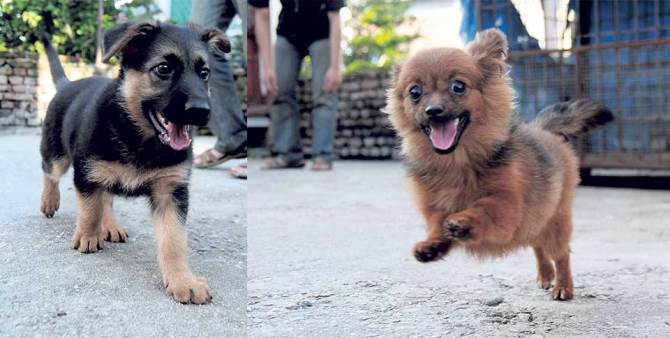Valley dogs found infected with communicable tumour

By A Staff Reporter
Kathmandu, Nov.2: A large number of stray and pet) dogs in the Kathmandu Valley are found to be infected with Canine Transmissible Venereal Tumours (CTVT), a type of communicable canine cancer, for the last few years.
"This type of cancer is aggressive and very damaging, most commonly destroying the genitals of both male and female dogs, leaving large open tumours that spread throughout the body as well as to other dogs," said Samuel G. Davies, infectious disease specialist at Kathmandu Animal Treatment Centre (KAT). CTVT is a sexually transmitted tumour in dogs, he added.
“We started to formally research this problem back in 2018 and found year on year the number of cases increasing rapidly. In the first six months of 2019 alone, 30 per cent of all the dogs that KAT treated were found to have this transmissible cancer. This clearly showed that the stray population is facing a cancer epidemic, which is quite possibly the largest threat to animal welfare,” he said.
Davies claimed that KAT was setting up a new programme, the first of its kind anywhere in Asia, to research, provide information, treat and fight the spread of this cancer: the KAT Cancer Control Programme.
In 2019 alone, KAT treated some 280 stray dogs with cancer successfully, helping to prevent its spread to other dogs. “However, to make an impact we need to survey, map, screen, isolate and treat thousands of more dogs to bring this cancer under control,” he said.
KAT is setting up a formal programme with advice and support from international partners and veterinary experts from the Cambridge School of Veterinary Medicine, to develop a programme capable of reversing the spread of the cancer. “We are aiming to open up a purpose-built cancer treatment unit in Kathmandu and treat 1,000 dogs next year (2021),” he said.
CTVT is one of only three known types of cancer that can spread between individuals of a species and the animal. An estimated 7,500 infected dogs are in Kathmandu and this number grows every month, according to KAT centre.
The main reason for spreading cancer among the stray dogs in Nepal is the unchecked breeding and lack of systematic health screening in the stray population, Davies said. He said when a dog stays in a particular area and the cancer cells from its body are left on the ground, and then are picked up again when a new dog rests there, so it would be easy to transfer the disease one to another, he said.
Recent News

Do not make expressions casting dout on election: EC
14 Apr, 2022
CM Bhatta says may New Year 2079 BS inspire positive thinking
14 Apr, 2022
Three new cases, 44 recoveries in 24 hours
14 Apr, 2022
689 climbers of 84 teams so far acquire permits for climbing various peaks this spring season
14 Apr, 2022
How the rising cost of living crisis is impacting Nepal
14 Apr, 2022
US military confirms an interstellar meteor collided with Earth
14 Apr, 2022
Valneva Covid vaccine approved for use in UK
14 Apr, 2022
Chair Prachanda highlights need of unity among Maoist, Communist forces
14 Apr, 2022
Ranbir Kapoor and Alia Bhatt: Bollywood toasts star couple on wedding
14 Apr, 2022
President Bhandari confers decorations (Photo Feature)
14 Apr, 2022










